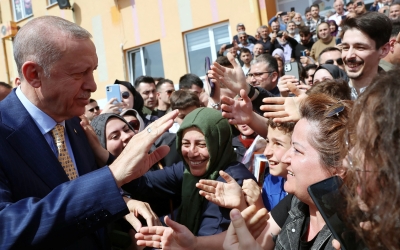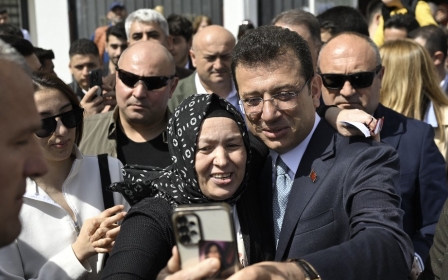Turkey imposes export restrictions to Israel over Gaza invasion

Turkey has halted the export of some products to Israel in response to its invasion of Gaza, as announced in a statement on Tuesday.
The Turkish trade ministry said that Israel continues to "flagrantly violate international law," ignoring calls for ceasefires and the uninterrupted provision of humanitarian aid to Gaza. These calls include decisions by the UN Security Council and judgements by the International Court of Justice.
"The decisions of the UN Security Council and the International Court of Justice are legally binding," the ministry's statement said. "Turkey has repeatedly stated that it will monitor the implementation of all these decisions."
Effective immediately, the ministry has restricted the export of 54 products to Israel, encompassing items such as aluminium wire, steel, cement, construction materials, granite, chemicals, pesticides, engine oils, jet fuel, and bricks.
"This decision will remain in effect until Israel, acting within its obligations under international law, declares an immediate ceasefire in Gaza and facilitates a sufficient and uninterrupted flow of humanitarian aid to the Gaza Strip,” the statement added.
New MEE newsletter: Jerusalem Dispatch
Sign up to get the latest insights and analysis on Israel-Palestine, alongside Turkey Unpacked and other MEE newsletters
On Monday, Turkish Foreign Minister Hakan Fidan announced that Turkey would take certain measures against Israel following Israel's refusal to grant aerial access to Gaza for humanitarian air drops.
This development occurred after the Turkish ruling Justice and Development Party (AKP) suffered a defeat in the 31 March local elections, losing votes to the Turkish Islamist New Welfare Party (YRP), which managed to secure victories over the AKP in several cities.
There is a consensus that the country’s economic problems, including declining real pensions and salaries amid runaway inflation, played a primary role in the AKP’s electoral defeat.
Israel factor in elections
While Turkey’s continuing trade with Israel was not the biggest issue prompting conservative voters to stay home or switch parties, it was a factor among others, which even Turkish President Recep Tayyip Erdogan acknowledged during a party meeting earlier this week on the election results, according to party sources.
Speaking about the AKP’s worst election defeat since 2002, Erdogan said on last week: “Unfortunately, even on an issue like the Gaza crisis, for which we did everything we could and paid the price, we failed to fend off political attacks and convince some people.”
Since the 7 October Hamas attack and subsequent Israeli war on Gaza, which Turkish President Recep Tayyip Erdogan calls genocidal, Turkey has gradually increased its criticism of Tel Aviv.
It recalled its ambassador for consultations, suspended energy talks, and backed Palestine on the international stage, from the UN General Assembly to western capitals through the Gaza Contact Group. Ankara also floated the idea of a guarantorship system to work towards a two-state solution.
In the early months of the conflict, while western capitals backed Israel’s war on Gaza, Erdogan used his platform to expose its genocidal actions. Turkey is also the largest humanitarian donor to Gaza, along with the UAE, according to Israeli government data, while dozens of Palestinian patients have travelled to Turkey from Gaza for medical treatment.
But it has avoided more punitive steps, arguing that they haven’t worked in the past when Ankara faced other crises with Tel Aviv. Although bilateral trade with Israel has dropped by 33 percent since 7 October, it has nonetheless continued.
Last year, as Turkish parliamentarians and pro-government circles boycotted companies accused of supporting Israel, one Turkish journalist began spotlighting the Turkish-Israeli trade. Metin Cihan, who lives in exile in Germany due to his past reporting on the killing of a Turkish girl, dug into open-source data on maritime trade.
“While Israel’s massacre continues, I listed the ships shipping from Turkey to Israel,” he posted on X (formerly Twitter) on 12 November, including the names of dozens of ships.
He later shared another list, noting: “We were shipping from our ports to Israel with an average of seven ships a day. We sent 13 more ships yesterday.”
As he started to regularly publish the names of ships going between Israel and Turkey, his tweets received millions of views. “Israel’s crude oil, fuel, iron and steel, etc. logistics were provided through our ports,” he said.
Cihan has also exposed persons and companies close to the government that trade with Israel.
Middle East Eye delivers independent and unrivalled coverage and analysis of the Middle East, North Africa and beyond. To learn more about republishing this content and the associated fees, please fill out this form. More about MEE can be found here.





